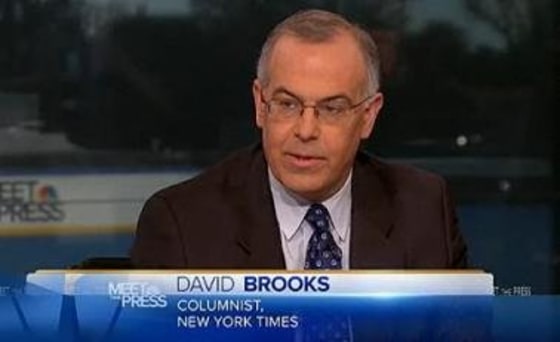About once every six months or so, David Brooks takes off the gloves and condemns what's become of the Republican Party. The last standout column came in July, when Brooks said the radicalized GOP, no longer "a normal party," is arguably "not fit to govern." Too many Republicans, he added, "have no sense of moral decency."
Brooks wasn't quite as confrontational today, but he came close, explaining the extent to which far-right protesters have taken over the party, forcing more responsible members to cower in submission. The party's grown-ups privately "bemoan where the party is headed," but "do nothing" in public.
All across the nation, there are mainstream Republicans lamenting how the party has grown more and more insular, more and more rigid. This year, they have an excellent chance to defeat President Obama, yet the wingers have trashed the party's reputation by swinging from one embarrassing and unelectable option to the next: Bachmann, Trump, Cain, Perry, Gingrich, Santorum. But where have these party leaders been over the past five years, when all the forces that distort the G.O.P. were metastasizing? Where were they during the rise of Sarah Palin and Glenn Beck? Where were they when Arizona passed its beyond-the-fringe immigration law? Where were they in the summer of 2011 when the House Republicans rejected even the possibility of budget compromise? They were lying low, hoping the unpleasantness would pass. The wingers call their Republican opponents RINOs, or Republican In Name Only. But that's an insult to the rhino, which is a tough, noble beast. If RINOs were like rhinos, they'd stand up to those who seek to destroy them. Actually, what the country needs is some real Rhino Republicans. But the professional Republicans never do that. They're not rhinos. They're Opossum Republicans. They tremble for a few seconds then slip into an involuntary coma every time they're challenged aggressively from the right.
As for the race for the GOP presidential nomination, Brooks added that the process has become "a series of heresy trials in which each of the candidates accuse the others of tribal impurity." The result is a nominee who's too extreme for the American mainstream or too weak after two years of pandering to extremists.
It's a sentiment that Republicans will likely ignore. Nevertheless, while one could probably ask Brooks if he's been as diligent as he should be about calling out the radicals in his party -- one condemnation every six months isn't going to change the GOP -- on the whole, the criticism is welcome and warranted.
